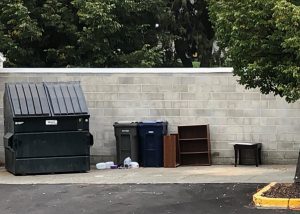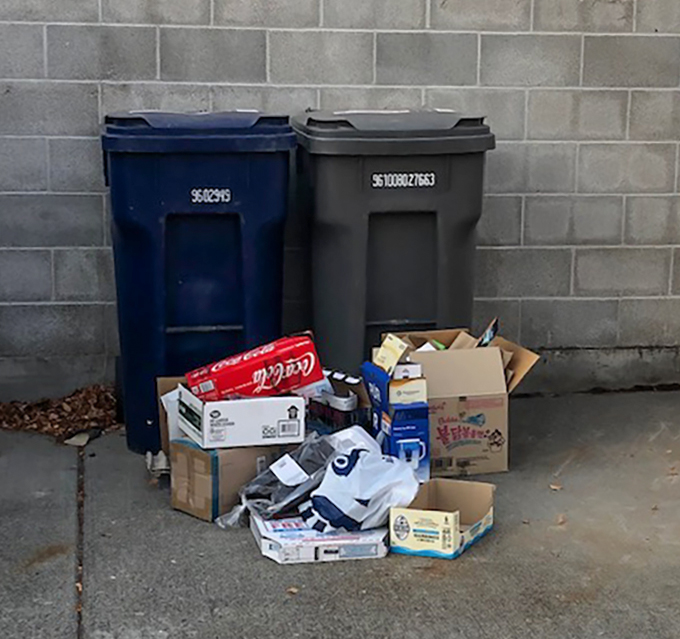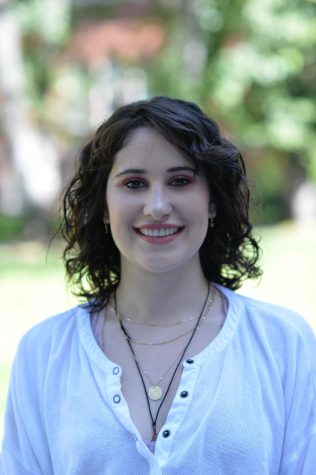Recycling bins removed without warning or explanation, student claims
Students criticize WSU for lack of communication, commitment to sustainability goal
One graduate resident at Yakama Village says there is a large buildup of recycling outside the complex.
October 12, 2020
WSU removed recycling bins from several student housing complexes without telling residents, claimed one graduate resident at Yakama Village, who raised concerns that the WSU administration no longer cares about sustainability for its students.
When Jose Riera, doctorate student at WSU’s College of Education, went a few weeks ago to put his recyclables into the bins that are usually next to the complex’s dumpster, he noticed a pile of empty recycling with none of the blue recycling bins in sight.
“I haven’t seen a blue bin in two to three months,” Riera said. “They are nowhere to be found.”
Emails sent to the Evergreen from residents, who wanted to remain anonymous because of employment at the university, confirmed the blue bins were also removed from Steptoe Village without any notice.
Rick Finch, manager of WSU Facilities Operations Waste Management, said they relocated but did not remove recycling bins at housing complexes to ensure safety and social distancing of their drivers in light of COVID-19.
The cost of recycling has begun to weigh heavily on the university’s already tight budget restrictions, Finch said. Before China stopped accepting recycling from the U.S., WSU made $17 per ton of recyclables, he said.
Now it costs about $140 per ton to process, he said.
“We want to be real upfront and transparent about our program, and these are the realities of recycling in eastern Washington,” Finch said.
Riera said WSU Housing and Dining, not necessarily Waste Management, holds the largest responsibility to notify students about changes.
“Housing and Dining are our customers, and we provide a service for them,” Finch said. “The students are their customers. And so we set up the program, we determine how we can best market and sell a commodity, [learn] what the demand is. And then we kind of establish the program criteria.”
When Riera attempted to learn about the location of recycling bins, he said he got a “vague non-answer” from housing officials. He received no messages through his myWSU account or from the housing mailing list prior to the removal of the bins, he said.
“You’re sending us bills every month. You know where we are,” Riera said.
Officials at WSU Housing and Residence Life have not yet responded to several calls and emails from the Evergreen.
Nathan Kite, Waste Management communication coordinator, said the department often posts changes on social media and did have clear signage at student housing complexes about the relocation of the bins.
Riera said the university should not rely on the assumption that students use social media as a way to communicate.
The university administration is “immersed in their own reality,” Riera said.
“We are paying the university for basic services, and that includes waste management,” Riera said. “You tell me how it’s more convenient for the residents. What are we supposed to do? Walk every bit of recycling to the waste management office?”
Finch said the waste management department faced many problems with contamination of recycling, especially since 2017. Only 25 to 50 percent of recycling is usable.
Selling recyclables is already difficult, Finch said, and made impossible when students throw contaminated recycling and materials like paper that cannot be accepted by waste management into the commingle bins.
Riera said this is not fair to students who care, and the university is making an assumption without speaking directly to students.
“If they have an issue with educating students on this, why don’t they come up with a better educational campaign?” Riera said.
Kite said the department improved its communication by posting consistently on its social media pages and on its YouTube channel, but it can be difficult because the recycling market changes constantly.
Meagann Russell, co-president of the WSU Environmental Science Club and environmental and ecosystem sciences major, said the lack of communication to students about recycling is part of the reason why students have trouble meeting the requirements.
“I think that’s somewhere we lack, and I think that’s why we went backwards, is because we thought we knew how to recycle but we really didn’t,” she said. “And so then that forced Wazzu to kind of limit how much they could recycle.”
Waste Management needs to keep up with these changes while fulfilling WSU’s mission of being sustainable, Kite said, which poses a challenge for them.
Finch said the department considered many options to address contamination and knew that any decision would make it less convenient for the students who do care.
However, Finch said the fact remains that most students were not using the recycling bins as they were intended, and it was more costly.
Russell said she understands the budget limits but would be “frustrated” and “baffled” if she lived in these complexes as to why Housing would make a decision to move or remove bins without talking to residents.
“You have to communicate with the students as to why you’re removing something very important like recycling and just changing it to trash,” she said, “because if you’re not communicating the reason why, then you’re left with the students making assumptions, and those assumptions are often bad.”
It leaves students to wonder if the goal of sustainability does not matter as much to WSU as money, she said.
Kite said students can always reach out through Twitter and Instagram with concerns about recycling opportunities. He said there are still many ways for students who do care to continue recycling.
Riera said more students care than WSU believes. Outside his apartment, he sees a larger and larger buildup of recycling, he said.

To him, this proves that students clearly do not know about the changes if they are still putting their materials next to the dumpster, he said.
“I know everyone is under a lot of stress,” he said. “We have to give each other a lot more breathing room, but to me, there’s no reason to not be communicating valuable information.”
The pile of recyclables has only grown since Riera got what he said was a vague answer from WSU Housing about the removal of the bins.
“It’s unsightly, it’s unsanitary, it’s a mess,” Riera said. “I try to be green in my life, and I think Washington state not only being a progressive state but on Native American land should do its duty to preserve nature.”










